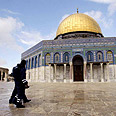
The opposite of holiness
Historical record shows political inclinations in Muslim Jerusalem claims
For 3,000 years the eternal city of Jerusalem has held the most exalted position in the Jewish religion, and a place of unparalleled importance in Jewish life and history.
First and foremost, King Solomon built the first Holy Temple in Jerusalem between the years 965 and 928 BCE. At that time the Holy Temple was the stronghold of the Jewish religion, containing the Holy Ark and the holiest altar in the nation for bringing ritual sacrifices as offerings to God. In the year 586 the Babylonian monarch Nebuchadnezzar invaded Jerusalem, destroyed the Holy Temple carried off its implements made of precious metals, and exiled the Jews of Jerusalem to Babylon.
Although Nebuchadnezzar had laid waste to the Holy Temple, its holiness remained and it was then the Jewish exiles swore: "if I forget you Jerusalem, may I forget my right hand and may my tongue adhere to the roof of my mouth if I do not remember," and generations of Jews have kept this vow to the present day. The nation longingly remembered the holiness of Jerusalem throughout thousands of years of exile.
The strong heartfelt desire every Jew has to see Jerusalem rebuilt in his lifetime and the centuries deep Jewish affection for the city King David founded are embodied in many important customs and prayers from Judaism's great sages. For example, the prayer: "And to Jerusalem, your city mercifully return, and dwell within it as you said. And build in it soon in our lifetimes," is repeated by every praying Jew several times a day.
At first glance, holy to Muslims, too
Various factors make Jerusalem holy to Muslims.
At first glance, the holiness of Jerusalem in the Muslim tradition stems from the belief that Muhammad the prophet founder of Islam rose to heaven from the site of the Holy Temple in Jerusalem. But other factors beside religious ones have played a role, too.
After the prophet died in June 632 a series of successors, or caliphs, assumed authority as Islam's leaders. Between 661 and 750 the Umayyad Dynasty held the Caliphate and ruled from Damascus. During the time they ruled, on account of various internal and external pressures the Umayyads exerted enormous effort to elevate Jerusalem's status, perhaps even to the level of Mecca.
Toward this end (as well as to assert Islam's presence in its competition with Christianity), the Umayyad caliph built Islam's first grand structure, the Dome of the Rock, right on the spot of the Jewish Temple, in 688-91, according to Middle East scholar Daniel Pipes.
The next step the Umayyads took to make Jerusalem holy to Islam relates to a passage in the Koran (17:1) that describes Muhammad's Night Journey to heaven: "Glory to He who took His servant by night from the Sacred Mosque to the furthest mosque. Pipes explains that when this Koranic passage was first revealed, in about 621, a place called the "Sacred Mosque" already existed in Mecca.
"In contrast," he goes on, "the 'furthest mosque' was a turn of phrase, not a place. Some early Muslims understood it as metaphorical or as a place in heaven."
In other words, the line about the furthest mosque in the Koran is just a figure of speech. Which means there is no basis for associating the furthest mosque - the Koranic location of the start of Muhammad's Night Journey - with the city of Jerusalem.
Political inclinations, not religious ones
In 715, Pipes writes, the Umayyads did something very clever. To build up the prestige of their domain, they built a second mosque in Jerusalem, again on the Temple Mount, and named this one the "Furthest Mosque" (i.e. al-masjidi al-aqsa) the exact same name written in the holy Koran. And in so doing, the Umayyads forced the city of Jerusalem to assume a role in the life of the prophet Muhammad. A role which it never had.
It's impossible to escape the conclusion, as the Palestinian historian A.L. Tibawi writes, that building an actual Al Aqsa Mosque "gave reality to the figurative name used in the Koran...." As Pipes points out, moreover, "it had the hugely important effect of giving Jerusalem a place in the Koran post hoc which naturally imbued the city with a higher status in Islam." Which is another way of saying, before the Umayyads built Dome of the Rock and Al Aksa, Jerusalem had no status at all in Islam.
Israeli scholar Izhak Hasson says: "construction of the Dome of the Rock and al-Aqsa mosque, the rituals instituted by the Umayyads on the Temple Mount and the dissemination of Islamic-oriented Traditions regarding sanctity of the site, all point to the political motives which underlay the glorification of Jerusalem among the Muslims."
In other words the sanctification of Jerusalem in Islam is based on the Umayyad building program. And their cleverness in bringing about a (baseless) association between the al-masjid al-aqsa mentioned in the holy Koran and the mosque they built on the Temple Mount and purposely named Al Aqsa, precisely so that it would assume a measure of Koranic holiness it did not have.
These days, the never-ending cry for a Palestinian state with Jerusalem as its capital surely contains a trace of the claim that the city is holy in Islam. But essentially the historic record shows that the actions and circumstances on which the claim is based aren't very holy at all. In fact, by any standard of religious values in any society in the world, artificially imbuing a place with holiness, through wordplay and administrative sleight of hand, constitute the very opposite of holiness.
Contact Yonatan Silverman at [email protected]










